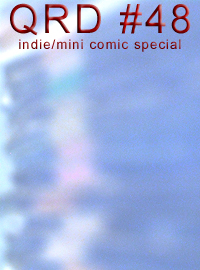
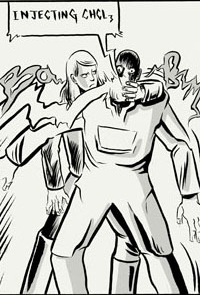
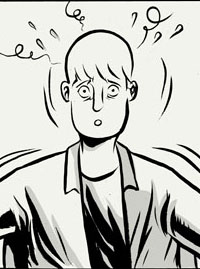
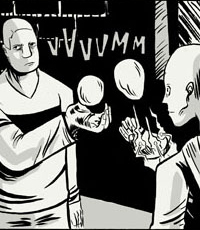
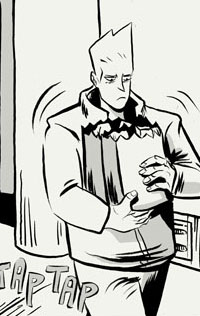
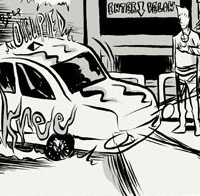








February 2011
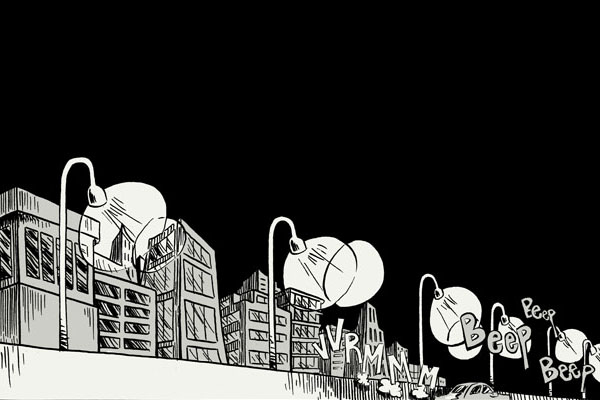
City: Providence, RI
Comics: Sexbuzz, Consumed, Just a Man
Websites: www.whitecomics.net
QRD – How old were you when you first got into comics & did you always stick with them or did you come back to them?
Andrew – I’ve always read comics of some sort, beginning, I would guess, with comic strips in the newspaper almost as soon as I knew how to read. I also began drawing comics at a fairly young age & I’ve really never stopped, but just become slowly more & more passionate about them over time.
QRD – What was the first comic book you ever bought?
Andrew – I’m not sure. Probably an issue of some superhero comic at around age 5 or 6, though there was also some Tintin & Asterix around in those early years, so those might have actually come first.
QRD – How old were you when you put out your first comic?
Andrew – I started posting comics online when I was around 15, although I didn’t publish anything until 17.
QRD – What decade do you think produced the best comics?
Andrew – The one that has just passed, from 2000 to 2010. Not to say that there haven’t been great comics before that, but I think that there’s a really high level of both diversity & intelligence in the best comics that have come out in recent years. Then again, I might be biased because the early 2000s are when I first became excited about reading & creating comics myself.
QRD – Why comics instead of just writing or drawing?
Andrew – I’ve done a fair amount of both
writing & drawing; but I always return to comics, which I find much
more enjoyable & creatively satisfying. I think that is in large part
because I love the way that comics combine writing & drawing into something
that ideally adds up to more than the sum of its parts. There are just
so many things you can do with words & pictures. In fact, I really
don’t think comics are anywhere near realizing their full potential as
a medium & I find that incredibly exciting.
QRD – Do you see mini-comics & indie
comics as paths to mainstream comics or as their own unique media?
Andrew – First of all, it’s important to note that I think you would be hard pressed to come up with an absolute delineation between independent & mainstream comics; there’s a sizable overlap between the two in a lot of cases. In terms of my own work, I don’t see the kind of comics I do as a means to the end of doing other types of work, be it in “mainstream” comics, movies, book, or anything else - I would be happy if I could just keep drawing comics on my own terms & getting more & more people to read them for the rest of my life.
QRD – How many copies of your comic do you print in your first run?
Andrew – So far, all of my comics have been printed through print on demand services such as Lulu.com, so the print runs are technically zero. That said, I do order 10-20 copies myself to sell by hand to local comic shops.
QRD – How much do you think comics should cost?
Andrew – For my own work, as little as possible while still allowing me to not lose money on printing costs. I don’t draw comics hoping to get rich & I want my comics to be read by as many people as possible. As such, I want price to be as small a factor as it can be in someone’s decision to read my work. That’s also why I post all of my work online - I can reach a much larger audience at almost no cost that way. As a comics reader, however, I’m personally willing to pay for quality production & presentation if it serves a given work. For instance, I buy French comics in their original album format whenever possible instead of the smaller, cheaper editions made for US markets because I think the large hardcovers do a better job of presenting those comics & make for a more enjoyable reading experience.
QRD – How many books do you produce a year & how many would you like to?
Andrew – My absolute minimum goal for the past few years has been to produce at least 120 pages of comics per year, or ten pages each month. I do wish that I could do more & to that end I think a lot about ways to manage my time more efficiently in general & ways to produce as much quality work as possible when I am able to draw. On the other hand, I don’t think I would want to do comics full-time, even if it meant I could get more done. I don’t ever want to have to think of comics as a job & be anything but thrilled whenever I get the chance to work on them. Having limited time for comics helps with that a lot.
QRD – Do you think stories should be serialized or delivered as complete works?
Andrew – There’s definitely no hard & fast rule. I’ve done both myself & I’ve seen both work for other comics. I would like to think that the choice depends entirely on the nature of the work, which is true in part, but there are a lot of practical concerns that factor in as well. For instance, a lot of cartoonists, myself included, see serialization as a great way to get feedback on projects that might take years to fully complete, as well as a means of keeping in touch with an audience - “I’m still around! Don’t forget about me!” On the other hand, the market for comics now is such that most published work has to be presented in book format & I try to keep that in mind even when producing work that is initially serialized.
QRD – How are comic strips different than comic books & which medium do you prefer?
Andrew – It’s all words & pictures. I don’t really see them as different mediums, but as different formats. I enjoy both, though unlike comic books I’m not a fan of most modern comic strips & much prefer older work like Frank King’s Gasoline Alley or Winsor McCay’s Little Nemo in Slumberland.
QRD – How long is it from when you start a comic until it’s printed?
Andrew – It depends on the length of the work, which can vary significantly. In terms of the timeline for actually producing a comic, I try not to rush too much during the writing process (which for me usually means thumbnails/layouts) & allow myself to discover the story, so to speak, at a more leisurely pace. Also, I’ll often set a completed story aside for several months to be able to look at it with fresh eyes. On the other hand, I try to work as quickly as possible without sacrificing quality for the actual drawing once I’ve reached that point in the process.
QRD – What do you do better with your comics now than when you first started?
Andrew – I think that I’m much more conscious than I used to be about the way my comics are constructed & I work hard to compose them in a way that is original but still readable. I think a lot these days about things like page layout, panel composition, flow, etc; whereas I used to compose my pages in a more intuitive & perhaps even careless manner. Hopefully, a more active awareness of those structural elements leads to a better, more enjoyable end product. My technical abilities are slowly improving as well, of course; but I still have a lot of work to do before I arrive at a place where I’m happy with how my drawings look.
QRD – At what point in the artistic process do you work digitally?
Andrew – My pages are thumbnailed, penciled, inked, & lettered traditionally; but I will sometimes make small corrections on the computer (things like a misplaced mouth or a poorly lettered word). If an entire panel needs to be redrawn though (as often happens), I’ll do that traditionally as well & then insert it onto the page digitally. I also add tones & colors using the computer & while I certainly appreciate how much easier technology has made those parts of the process, I personally don’t especially enjoy drawing on the computer.
QRD – What do you think of digital comics & webcomics?
Andrew – I’m pretty sure that I wouldn’t be doing comics at all & certainly not as devotedly, if it were not for the Internet. I post all of my work online & all of the connections I have made in the comics world, either with other cartoonists or with people who enjoy reading my work, have been exclusively through online interactions. The encouragement & feedback I have gotten about my work through the Internet has been essential in both helping me to grow as a cartoonist & in keeping me motivated to continue doing comics. That said, I have a great love for print & the majority of my comics are designed with the final destination of print in mind. I’m actually beginning to work on something that I’m kind of facetiously thinking of as my first webcomic. What I mean is that it’s the first story which I’m designing explicitly to be read on the screen, considering vertical scrolling & clicks instead of page turns in terms of how I design & pace it.
QRD – Do you prefer working in color or black & white?
Andrew – At this point, I’m much more comfortable with black & white. However, I would like to do more work in color in the future.
QRD – How many different people should work on a comic & what should their jobs be?
Andrew – Aside from a few exceptions that, I would argue, prove the rule, the artistic vision of a single cartoonist working alone usually produces the work that I most enjoy reading. I actually think that ability for a single individual to fully conceptualize & produce a project with no outside interference in a way that can’t be done in many other entertainment media is one of the great things about comics.
QRD – How do you find collaborators?
Andrew – I don’t really seek them out, because I usually prefer to work alone. However, I have done a few short-term collaborative projects, which provide a nice change of pace.
QRD – How tight do you think a script should be as far as telling the artist what to draw?
Andrew – I have almost no experience working from scripts, so take this answer with a grain of salt; but my feeling is that in general an overly detailed script is pandering & perhaps even a little insulting to an artist’s skill & intelligence. Any artist worth collaborating with understands the mechanics of visual storytelling in a way that will allow them to choose the camera angles, page layouts, compositions, etc. that will read best. In most cases, that kind of stuff shouldn’t be specified in a script unless it is explicitly an element of the plot.
QRD – What comic book person would you be most flattered to be compared to?
Andrew – I’m not sure who specifically, but being mentioned in the same breath as any cartoonist with a strong work ethic, unique voice, & complete devotion to their craft would be quite flattering indeed.
QRD – What do your friends & family think of your comics?
Andrew – They’re tolerant & they’ve occasionally read bits of my work, but I think they have a hard time understanding why I choose to spend so much time on comics when I don’t see it as a career & make very little money from it.
QRD – What do you think of superheroes?
Andrew – I don’t follow monthly superhero comics at all, mostly because I find that whole world kind of confusing & intimidating, but I enjoy a great superhero comic just as much as I enjoy a great comic in any other genre. That said, it isn’t a genre I’m too interested in exploring in my own work.
QRD – Marvel or DC?
Andrew – I don’t have any real allegiance to or preference for either. They both publish good comics every once in a while, but they don’t seem too different to me in terms of aesthetic or approach.
QRD – What comic characters other than your own would you like to work with?
Andrew – I don’t know if I would want to work with any other cartoonist’s characters, but it might be fun to do a story set in the same world as some of my favorite comics.
QRD – Ideally would you self-publish?
Andrew – No. To be honest, I really don’t enjoy the various non-comics duties related to self-publishing at all. I have a fairly limited amount of time to spend working on comics & ideally I would like to spend all of it actually Working on Comics rather than preparing a book for print or promoting it online. I understand that the complete control self-publishing offers is compelling to some people & it’s a great option when (like me) your work isn’t yet at a level where it would be attractive to publishers, but personally I would love for someone else to take care of the publishing side of the equation.
QRD – What conventions do you try to attend & why?
Andrew – I’ve never been to a comic convention, though I find the idea of spending time in a room full of people who love comics as much as I do really appealing & perhaps also a little intimidating. It’s something I would like to begin doing at some point, but mostly due to finances I haven’t done so just yet.
QRD – What do you do to promote your books?
Andrew – Not as much as I should, probably. I’m fairly active on social networks such as Twitter & Tumblr & I maintain a presence on a few forums, but that’s about it.
QRD – Do you think your comics are well suited to comic shops or would sell better elsewhere?
Andrew – I have no idea, but I will say that it’s great that it doesn’t have to be an either/or equation - good comics are sold in comic shops, bookstores, & online; making it much easier to purchase any given work than it might have been in the past. That’s definitely good news.
QRD – What other medium would you like to see some of your comics made into (television, film, games, action figures, etc.)?
Andrew – Maybe this is kind of pretentious, but I’d like to think that if I’m doing my job right, my comics will work best as comics. I therefore wouldn’t really be interesting in having an active role in the adaptation of my work to other media, but I certainly wouldn’t say no to a paycheck from a television or film studio!
QRD – Do you consider yourself a comic collector or a comic reader or both?
Andrew – Both, but heavy on the reader & light on the collector. I do search out & collect some comics; but that’s just to be able to read good work that hasn’t been reprinted, like Paul Pope’s THB or Chester Brown’s Underwater.
QRD – What do you see as the most viable mediums for comics distribution 10 years from now?
Andrew – Online, without a doubt. I think print will still be around in tens years, but to a significantly lesser extent. I know that I will always want to own physical copies of books & comics I enjoy, but I expect that will be the case for fewer & fewer people going forward. Additionally, I think that a lot of the reservations that some cartoonists have about posting their work online right now will fall away fairly quickly as the technology for distribution & presentation improves in a variety of ways. We’ve already seen the challenges of presenting work online lead to some interesting innovations in format & I expect there will be even more of that in the future as well, which is exciting.
QRD – What would you like to see more people doing with comics?
Andrew – My favorite cartoonists are those that are clearly approaching their work with both passion & singularity of vision, with little to no concern for commercial viability or anything. I want to see more of that.
QRD – Anything else?
Andrew – My main project right now is a
slice of life science fiction comic called Sexbuzz & I would really
appreciate if anyone reading this could take a moment to check it out (www.whitecomics.net/sxbz1.html).
I’m serializing it by posting entire chapters online as I complete them,
which I think makes for a much more enjoyable reading experience than the
standard online practice of posting one page at a time. I have completed
two chapters to date & the third will be done very soon, so if you
enjoy what is online right now, keep an eye on my blog (whitecomics.livejournal.com)
or twitter (twitter.com/whitecomics)
to find out when a new chapter has been posted.
Finally, thanks to QRD & Brian John
Mitchell for offering me this opportunity to discuss my work. I’ve really
enjoyed it!







